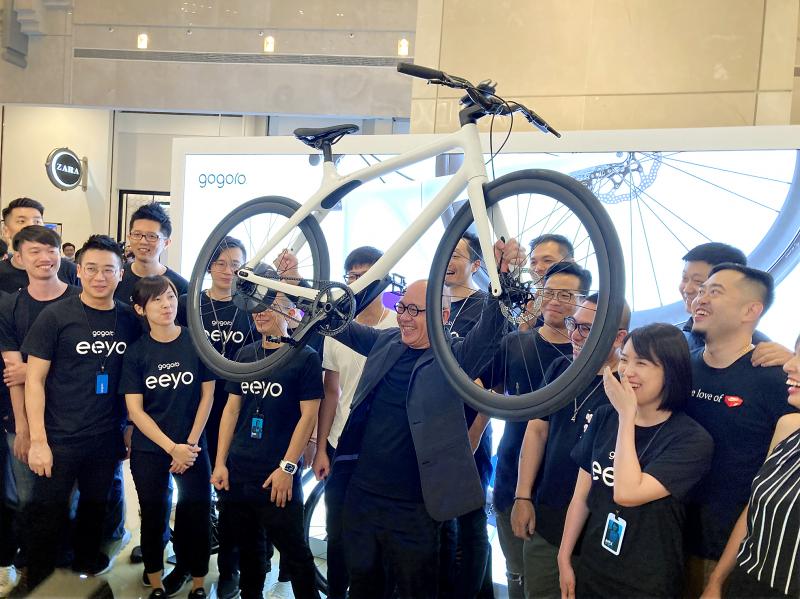Gogoro Inc (睿能創意) yesterday launched its first electric bicycle, the Gogoro Eeyo 1, in Taiwan, after unveiling the bike in New York in late May and in France on Tuesday.
The company said it would also introduce the series in other European countries such as Germany and the Netherlands.
The “Eeyo project” is the fourth of Gogoro’s eight projects that concentrate on smart transportation, which includes Gogoro’s electric scooter, battery swap system and electric scooter sharing service, company founder and chief executive officer Horace Luke (陸學森) told a media briefing in Taipei.

Photo: Lisa Wang, Taipei Times
“There are various types of city commuters. We will not focus on only one type of commuter. We want to expand our reach to overseas markets by offering different technologies and products,” Luke said.
“The electric bike market is much larger than that of electric scooters,” Luke said.
In Germany, 1.8 million electric scooters were sold last year, but sales of electric bikes were two to three times that number, he said.
With a carbon fiber frame, Gogoro Eeyo 1 weighs only 11.8kg — almost half the weight of electric bikes on the market — and carries a minimum price tag of NT$119,980, the company said.
Gogoro has packed all of the bike’s electric components — including a motor, battery and sensors — inside its rear hub.
The company has set up its first flagship store for the Eeyo series at Taipei 101. The bikes will also be available at select stores operated by Gogoro and eight stores of its distributor Pentagon Co (聚昕), it said.
Overseas, the Eeyo series would only be available in virtual stores in the initial stage, Gogoro said.
The company said it is in talks with several bike vendors over potential electric bike production, duplicating the business model it has for electric scooters.
Gogoro produces electric scooters for Yamaha Motor Taiwan Co (台灣山葉), Aeon Motor Co (宏佳騰), Motive Power Industry Co (摩特動力) and Suzuki Motor Corp in Taiwan.
“There are a lot of small-scale bike makers that do not have the capability to develop their own electric models. They can opt for Gogoro to help, if they want to tap into this market,” Gogoro marketing chief Peng Ming-i (彭明義) told reporters.
With Gogoro’s rear hub, those conventional bicycles can be transformed into electric bikes, Peng said.
“We are in talks with some partners,” he said.
Gogoro said it does not plan to launch sharing services for its electric bikes in the short term.

In Italy’s storied gold-making hubs, jewelers are reworking their designs to trim gold content as they race to blunt the effect of record prices and appeal to shoppers watching their budgets. Gold prices hit a record high on Thursday, surging near US$5,600 an ounce, more than double a year ago as geopolitical concerns and jitters over trade pushed investors toward the safe-haven asset. The rally is putting undue pressure on small artisans as they face mounting demands from customers, including international brands, to produce cheaper items, from signature pieces to wedding rings, according to interviews with four independent jewelers in Italy’s main

Macronix International Co (旺宏), the world’s biggest NOR flash memory supplier, yesterday said it would spend NT$22 billion (US$699.1 million) on capacity expansion this year to increase its production of mid-to-low-density memory chips as the world’s major memorychip suppliers are phasing out the market. The company said its planned capital expenditures are about 11 times higher than the NT$1.8 billion it spent on new facilities and equipment last year. A majority of this year’s outlay would be allocated to step up capacity of multi-level cell (MLC) NAND flash memory chips, which are used in embedded multimedia cards (eMMC), a managed

In the wake of strong global demand for AI applications, Taiwan’s export-oriented economy accelerated with the composite index of economic indicators flashing the first “red” light in December for one year, indicating the economy is in booming mode, the National Development Council (NDC) said yesterday. Moreover, the index of leading indicators, which gauges the potential state of the economy over the next six months, also moved higher in December amid growing optimism over the outlook, the NDC said. In December, the index of economic indicators rose one point from a month earlier to 38, at the lower end of the “red” light.

The global server market is expected to grow 12.8 percent annually this year, with artificial intelligence (AI) servers projected to account for 16.5 percent, driven by continued investment in AI infrastructure by major cloud service providers (CSPs), market researcher TrendForce Corp (集邦科技) said yesterday. Global AI server shipments this year are expected to increase 28 percent year-on-year to more than 2.7 million units, driven by sustained demand from CSPs and government sovereign cloud projects, TrendForce analyst Frank Kung (龔明德) told the Taipei Times. Demand for GPU-based AI servers, including Nvidia Corp’s GB and Vera Rubin rack systems, is expected to remain high,